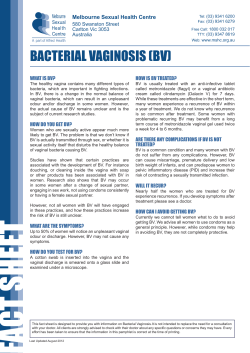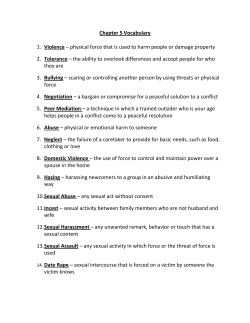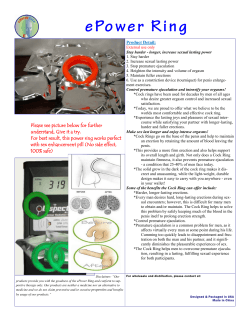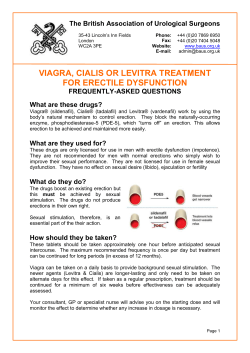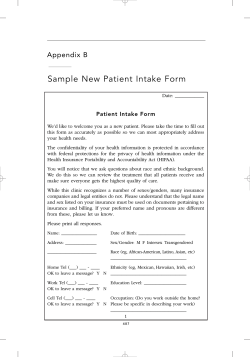
British Society for Sexual Medicine (BSSM) Treatment Algorithm for Premature Ejaculation (PE) July 2013
British Society for Sexual Medicine (BSSM) Treatment Algorithm for Premature Ejaculation (PE) July 2013 Although reliable information on the prevalence of lifelong and acquired PE is lacking when based upon patient self-report, PE is the most common male sexual dysfunction. Lifelong PE is defined as: ‘A male sexual dysfunction characterised by ejaculation which always or nearly always occurs prior to or within about one minute of vaginal penetration and the inability to delay ejaculation on all or nearly all vaginal penetrations, and negative personal consequences, such as distress, bother, frustration and/or the avoidance of sexual intimacy.’ To help you manage PE appropriately, we have proposed the following algorithm to guide you through the treatment options. It is important to distinguish between Erectile Dysfunction (ED) and PE so the following questions are useful: • Is your erection hard enough to penetrate? • Do you have difficulty in maintaining your erection until you ejaculate during intercourse? • Do you ever rush intercourse to prevent loss of your erection? PATIENT/PARTNER HISTORY Six questions that can help to identify PE are: • • • • • • • • Can you delay ejaculation before vaginal penetration? • What is the time between penetration and ejaculation? • Can you delay ejaculation? • Do you and/or your partner feel bothered, annoyed, Establish presenting complaint Time taken to ejaculate after vaginal penetration Perceived degree of ejaculatory control Degree of patient/partner distress Onset and duration of PE Psychological history Medical history NO Is your PE affecting your relationship? • Do you and/or your partner avoid sexual intercourse because of embarrassment? YES PE PE LIKE EJACULATORY DYSFUNCTION NATURAL VARIABLE YES PE SECONDARY TO ED OR OTHER SEXUAL DYSFUNCTION TREATMENT • • • • and/or frustrated by your PE? • YES MANAGE PRIMARY CAUSE NO Reassurance Education Psychotherapy Behavioural therapy Lifelong and acquired PE can be differentiated by enquiring: • When did you first experience PE? • Have you experienced PE since your first sexual experience on every/almost every attempt and with every partner? ACQUIRED PE LIFELONG PE TREATMENT TREATMENT • Behavioural/psychotherapy • Pharmacotherapy • Combination treatment PATIENT PREFERENCE • Pharmacotherapy • Behavioural/psychotherapy • Combination treatment Attempt graduated withdrawal of drug therapy in selected patients (generally acquired PE), after 6-8weeks Pharmacotherapy Oral therapies: TREATMENT OPTIONS • Short half-life on demand SSRIs specifically suggesting a role in treating PE e.g. dapoxetine - which is the only oral licensed medication for the treatment of PE • Off label SSRIs and TCAs that have been used as a daily treatment for PE e.g. paroxetine, sertraline, fluoxetine, citalopram and clomipramine • PDE5 inhibitors used on demand as a combination treatment with SSRIs, when PE co-exists with ED • Tramadol, an opiate derivative (usually used as an analgesic) but could be used where PE co-exists with a need for analgesia Topical therapies: • Off label lidocaine/prilocaine Behavioural/psychological Therapies have been incorporated for a number of years but quantitative research shows benefit is not forthcoming. Nevertheless many patients are understandably anxious and may appreciate psychotherapy. Algorithm is based on guidance from The International Society of Sexual Medicine (The Journal of Sexual Medicine 2010; 7:2947-2969) SSRI: Selective Serotonin Reuptake Inhibitor TCA: Tricyclic Antidepressant PDE5: phosphodiesterase type 5 This algorithm has been independently produced by BSSM. Support and funding has been provided by A. Menarini Farmaceutica Internazionale SRL
© Copyright 2025

